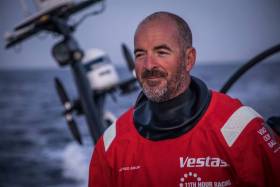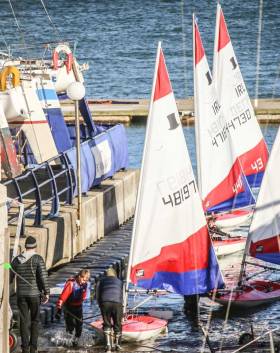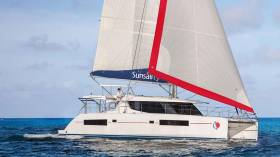Displaying items by tag: Sailing Clubs
Third Texaco ‘Support for Sport’ Club Funding Initiative Launched
The Texaco Support for Sport funding initiative – which, to date has seen €260,000 distributed amongst 52 sports clubs across Ireland – has been launched for the third successive year.
Under the scheme, hosted by Valero Energy (Ireland) Limited, the company that markets fuel in Ireland under the Texaco brand, a fund of €130,000 will be distributed to twenty-six sports clubs on a county-by-county basis, with successful applicants receiving €5,000 in each case.
Open to sports clubs across the 26 counties, irrespective of sporting discipline, size, membership, age, cultural appeal or gender (including clubs that may have made an unsuccessful application previously), the initiative is one that recognises and supports the valuable contribution that sports clubs make to communities and throughout Irish society as a whole.
With two years completed, clubs that have received funding span the spectrum of Irish sporting activity. Amongst them were athletics, badminton, basketball, boxing, camogie, climbing, cricket, diving, Gaelic football, golf, handball, hockey, hurling, rowing, rugby, soccer and tennis.
‘Avenue to funding’
Launching the 2023 programme, James Twohig, Director of Ireland Operations, Valero Energy (Ireland) Limited described the Texaco Support for Sport initiative as one that “opens up an avenue to funding for those clubs and communities that need it most.”
Seeing sports clubs as ‘the heart and soul of community life’ in so many Irish cities, towns and villages, Mr. Twohig went on to say how pleased his company is to provide “a new and significant route to revenue for sports clubs, many of which have faced difficult challenges of one kind or another in recent times.”
Adjudication
Again leading the adjudication process is Texaco Support for Sport ambassador, broadcaster and former Irish rugby international Donncha O’Callaghan. O’Callaghan said that the most heartening aspect of the Texaco Support for Sport initiative is ‘the extent to which it brings much-needed benefit to clubs when least expected.’
“Through the scheme, even the smallest and most remote clubs and minority interest groupings have had access to the vital funds they needed to develop facilities, increase memberships, and broaden their appeal within their communities, at grassroot level,” he said.
Application
Following similar lines to that which proved successful over the past two years, the application process is now open online at www.texacosupportforsport.com where full details of the initiative and its operation can be viewed.
Clubs wishing to apply can first register their interest to be followed, before closing date, by a completed application that should include full details of their sporting activity, the importance that the club holds in their local community, the purpose for which the funding is sought and the use to which it will be put.
A sole qualifying requirement is that clubs making application must be properly constituted and supply confirmation of a valid Games & Sports Exemption number (GS number) which has been issued by the Office of the Revenue Commissioners.
Closing date for applications is 31st January 2023 with adjudication taking place thereafter.
Second Texaco Support for Sport Initiative Launched
For the second successive year, Valero Energy (Ireland) Limited – the company that markets fuel in Ireland under the Texaco brand – has confirmed its commitment to host the 2021 Texaco Support for Sport initiative.
Under the scheme, which follows a similar line to that which proved so successful last year, a gross fund of €130,000 is being set aside for distribution to sports clubs on a twenty-six, county-by-county basis, with successful applicants receiving €5,000 in each case.
Open to sports clubs across the 26-counties, irrespective of sporting discipline, size, membership, age, cultural appeal or gender – including clubs that may have made an unsuccessful application previously – the initiative recognises the valuable contribution that sports clubs make to communities and throughout Irish society as a whole.
Last year, winning clubs spanned the spectrum of Irish sporting activity. Included were the popular sports of athletics, basketball, boxing, camogie, Gaelic football, handball, hockey, hurling, rugby, soccer and swimming. More unusual sports such as cricket, climbing and diving also featured in the winners’ line up.
Speaking at the launch of the 2021 initiative, James Twohig, Director of Ireland Operations, Valero Energy (Ireland) Limited said: “Mindful that sport is at the heart of so many communities throughout the country and a key component in the fabric of Irish society, we are delighted to host Texaco Support for Sport for the second year in succession. At a time when many sports clubs have had to weather difficulties and limitations of one kind or another, the Texaco Support for Sport initiative opens up an avenue to funding for those that need it most.
“As shown last year, this can include structural enhancements, improvements to facilities, purchase of new equipment and community inclusive measures to broaden and enhance the appeal of many sports clubs within their communities,” he added.
Adjudication
Leading the adjudication process once again is Texaco Support for Sport ambassador, acclaimed broadcaster and former Irish rugby international, Donncha O’Callaghan. Commenting, he said that the most heartening aspect of last year’s Texaco Support for Sport initiative was the extent to which sporting spirit is alive and prospering amongst communities throughout Ireland.
“Through the scheme, a fantastic system now exists whereby even the smallest and most remote clubs and minority interest groupings can have access to the vital funds they need in order to develop and serve their memberships, hence enhancing their communities. I’m delighted & really looking forward to seeing the incredible work being done by clubs & volunteers at the most important level, our grassroots,” he said.
Application
Sports clubs can now apply for Texaco Support for Sport funding, the only requirement being that they be properly constituted and hold a valid Games & Sports Number (GS Number) issued by the Office of the Revenue Commissioners and featured on a recent list published by them on 30th June 2021.
Those wishing to apply are invited to submit full details of their sporting activity, the purpose for which the funding is sought and the use to which it will be put. Full details of the scheme and its operation – together with registration, application, validation, adjudication and terms and conditions – are available to view here
Closing date for applications is the 31 December 2021 with adjudication taking place in January 2022.
Irish Sailing Host Club Symposium at Hodson Bay Hotel
After the success of the inaugural Club Symposium last year Irish Sailing is planning a bigger and better conference focusing on how we connect with our members and create a tribal culture as we adapt to changing times. The symposium is aimed at people clubs and centres throughout the country who are passionate ‘doers’, growth promoters, media managers and organisational leaders. Our aim is to:
- Connect and learn as a group by sharing our experiences through small group sessions facilitated by experienced club volunteers.
- Look at innovative training products around the country and rethink the promotion of clubs/centres using digital media.
- “Your voice your say” and together forge the way for the future of sailing in our organisations, following on from last year’s stop-start continue session
We will be welcoming prominent guest speakers sharing successful club stories with you on the day.
There will be plenty of coffee breaks to give attendees ample opportunity to network with like-minded doers, the facilitated workshops will be short and in small groups to give each attendee a chance to attend all workshops and actively engage in the sharing and a panel discussion with group tasks developing strategic plans for Irish Sailing. The event is free and there is a lunch deal available on the day.
Sailing Clubs Should Take Immediate Action Against Plastics
Sailing and yacht clubs should start appointing Sustainability Officers and every club and boat should immediately “kick out” single-use plastics from every aspect of their sport – both aboard and ashore.
That is the view of one of Ireland’s top international sailors.
“No place for them, not on the family boat, the dinghy, the crewed racing yacht, in the club bar having a drink, let’s kick out single-use plastic immediately, no debate about that.”
"It is a strong, blunt view by Damian Foxall in his role as Irish Sailing’s Sustainability Ambassador"
It is a strong, blunt view by Damian Foxall in his role as Irish Sailing’s Sustainability Ambassador. From the days when I first met him in Kerry and lunched with him at my home in Cork Harbour before he took a ferry to France, many years ago and began his international campaign as a ‘rookie’ in the Figaro Race, to where he is now, Damian has been focussed and determined in what he intends to achieve.
Interviewed for a future edition of my radio programme, THIS ISLAND NATION, about his new role, he was equally forthright. As World Sailing moves towards outlining its approach towards sustainability on the international scene, Damian and Irish Sailing are advancing theirs.
He does not see diesel being replaced in boat engines for some time yet, but there are other initiatives to be taken, he says. Where the marine environment is concerned we can all take some action. His comments follow an equally forthright declaration by another person I interviewed, Professor Michael Jansen at the School of Biological, Earth and Environmental Sciences in University College Cork, who is one of the leading scientists investigating the threat of microplastics to the marine environment.
He told me that “microplastics are everywhere” and the main threat comes from freshwater to the marine environment.
• Listen to the Podcast here as Damian Foxall outlines what he thinks clubs and individuals should be doing for protection of the marine environment.
Sailing Clubs Benefit in Sports Capital Grants: €1m to 30 Clubs Across the Country
Irish sailing clubs are among 1,700 sports clubs nationwide receiving €56m in the latest round of sports capital grants, it was confirmed this morning. (Download the full list of grants awarded below).
30 sailing clubs throughout the country will share over a million in funding.
Dun Laoghaire's National Yacht Club on Dublin Bay is one of the biggest sailing club recipients with a grant of €142,375 for Increasing women and teenagers participation in the sport. The east pier club is the home of Rio Olympic silver medalist Annalise Murphy.
Also in Dun Laoghaire, the country's bggest sailing centre, the Irish National Sailing Club (Locaste) got €40,058 for the renewal of sailing equipment and the purchase of new boats.
The Royal St. George Yacht Club (RSGYC) got €31,228 for a Firefly dinghy renewal programme, Dun Laoghaire Motor Yacht Club got €18,515 for the purchase of a 5m RIB and capstan winch. The Royal Irish Yacht Club got €25,000 for its safety and support fleet. Dublin Bay Sailing Club got €11,236
In Cork Harbour, Royal Cork Yacht Club were awarded €13,000 for support craft for teaching water sports
The programme is the primary means of providing Government funding for capital projects to sport and community organisations at local, regional and national level.
'This funding will give make a considerable impact on access to sailing in regional clubs, as well as help develop and improve sailing facilities. The pay back is the physical and mental benefits of sailing to local communities, ' according to an Irish Sailing spokesperson.
The 2017 round for applications closed in February with a record number of 2,320 received.
Around the coast – and on lakes and rivers too – sailing clubs shared in the distribution of the captial funds.
In Limerick, Foynes Yacht Club was awarded €16,500 for Physically Disabled Sailing. Sligo Yacht Club got €8,000 for its 'Try A Sail' and 'Inclusion for All' project.
In Tipperary, Lough Derg Yacht Club was awarded €4,000 for its access for all programme.
In Westmeath, Lough Ree Yacht Club got €12,500 to replace destroyed electrics and to buy two boats.
In West Cork, Glandore Harbour Yacht Club has €16,000 for a new clubhouse roof & canopy.
Minister Shane Ross said at the announcement: "This is a great day for Irish sport. When we originally invited applications under the scheme, we had just €30m to allocate and the record level of applications would have left a large number of good projects unsupported and many clubs disappointed.
"Happily, following the conclusion of budget discussions, I was delighted to secure the required additional resources to enable me to allocate €56m in total to local sports clubs and organisations throughout the country.
"The net result of this is that we are able to provide financial assistance towards over 1,700 different projects all over the country.
"The benefits of participating in sport are well documented, for both physical and mental health, and these new grants for local clubs will help us in our overall objective of getting as many people participating in sport as possible.
"The grants are also excellent news for our communities both rural and urban, as club sport is a superb way to bolster local pride, affinity and inclusion."
A further €4m has been set aside for regional grants. These allocations are expected to be announced in the coming weeks.
| Killaloe Sailing Club | Sail Training Dinghies for Children and Teenagers | €6,000 |
| Bantry Bay Sailing Club Bantry Bay Sailing Club | Club Development | €23,000 |
| Bere Island Projects Group Ltd | Bringing Sailing back to Bere Island | €11,000 |
| Glandore Harbour Yacht Club | New clubhouse roof & canopy over adjacent yard | €16,000 |
| Kinsale Yacht Club Company Ltd | Rigid Inflatable boat (RIB) for training & safety | €8,000 |
| Monkstown Bay Sailing Club | Changing rooms renovation & engine upgrade | €8,000 |
| Royal Cork Yacht Club | Support Craft for teaching water sports | €13,000 |
| Schull Harbour sailing Club Ltd S | RIB – Dinghy Sailing & Cruiser Crewing | €18,000 |
| Clontarf Yacht & Boat | Club upgrade facilities for equality of access at CYBC | €136,943 |
| Dublin Bay Sailing Club | Sports Equipment | €11,236 |
| Malahide Yacht Club | Essential Rescue Equipment | €61,200 |
| Poolbeg Yacht and Boat Club | Dublin City Community Sailing | €150,000 |
| Royal Irish Yacht Club | Safety and support fleet | €25,000 |
| Rush Sailing Club | Expansion & Refurb of changing & toilet facilities | €130,381 |
| Sailing in Dublin Club Ltd | Keelboat for racing and training | €20,000 |
| The National Yacht Club | Increasing Women and Teenagers participation | €142,375 |
| The Royal St. George Yacht Club RSGYC | Club Firefly Dinghy Renewal | €31,228 |
| Galway Bay Sailing Club Ltd | RIB Purchase | €14,000 |
| Galway City Sailing Club | Sailing dinghies & Safety Boat for shared sailing | €17,500 |
| Foynes Yacht Club | Sailing in Foynes for Physically Disabled | €16,500 |
| Oriel Sailing Club | Purchase of sailing equipment | €6,000 |
| Mullaghmore Sailing Centre ltd. | Sailing boatsRescue boat engines, Club Refurb. | €11,500 |
| Sligo Yacht Club Ltd | ‘Try A Sail’ and Inclusion for All, Project | €8,000 |
| Lough Derg Yacht Club | School sailing and access4all programme | €4,000 |
| Waterford Harbour Sailing Club | New Rescue/Safety RIBs & Dinghies | €34,000 |
| Lough Ree Yacht Club | Replace Destroyed Electrics. Buy 2 Boats | €12,500 |
| Blessington Sailing Club | Community growth project | €15,000 |
| Bray Sailing Club | Growing sailing in the community | €19,591 |
| Greystones Sailing Club | Development boats | €10,000 |
| Wicklow Sailing Club | Rescue Craft and Storage | €46,000 |
| €1,025,954 |
Sunsail ‘Funding The Future For Sailing Clubs’ With New UK Competition
#SailingClubs - Sailing holiday firm Sunsail is ‘Funding the Future for Sailing Clubs’ in a new UK-wide competition for £5,000 in funding.
As British Marine reports, sailing and yachting clubs across Britain taking part must submit a business plan to detail what they would do with the funding — from new equipment to membership drives to youth sail training and more.
The club with the most innovative idea, as judged by a panel including Volvo Ocean Race veteran Dee Caffari, will win the investment to bring their plans to fruition — as well as a place on Sunsail’s stand at January’s London Boat Show.
British Marine has more on the story HERE.
#ClubNews - Sailing clubs are urged to give their security a rethink as news emerges of thieves apparently targeting boats in storage for their aluminium.
The Flying Fifteen Blog highlights a recent incident at Welton Sailing Club on the Humber Estuary in which "a significant number of aluminium masts were stolen from dinghies".
A member of Humber Yawl Club wrote of the break-in: "Shroud wires have been cut to release the masts, which must have been removed in either a lorry or a van.
"While the club has experienced break-ins in the past, this is the first occasion when aluminium materials have been stolen. It would appear the club was targeted specifically for this material."
That metal thieves, who commonly steal copper from railway cabling or lead from roofs, have turned their attention to aluminium fittings on boats should be of great concern to boat clubs throughout the UK and Ireland.
Many club storage facilities have at best only the protection of a padlock in exposed dinghy parks, as theft of boats themselves is a riskier proposition for criminals.
But as the scrap value of the aluminium boats contain increases, perhaps we should take another look at our boat club security measures.
Irish Yacht Clubs Lowering Fees To Attract New Members
#Sailing - Irish yacht clubs are "trying to ditch their elitist image" and cutting prices to attract a more diverse membership, according to The Sunday Times.
Members' fees across Ireland's top yacht clubs have been lowered by an average 15%, says the paper, while some clubs such as Skerries Sailing Club are experimenting with eliminating such fees altogether.
Even the world's oldest club, the Royal Cork Yacht Club, is offering an introductory rate of €180 for 2013.
While the attempt to broaden the horizons of club membership is fitting with the ISA's vision of a brighter future for Irish sailing after last year's "breakthrough year", the cutting of fees points to a different side to the story - one that puts last year's EGM on the ISA's funding structure and suggestions to radically rethink how Irish sailing spends its resources into perspective.
The Sunday Times has more on this story HERE.
Glandore Harbour Yacht Club Gets New Clubhouse
#GLANDORE HARBOUR - After 27 years, Glandore Harbour Yacht Club has finally acquired a clubhouse in the picturesque West Cork harbour village.
"It may have taken a long time but the reward is that we have ended up with a perfect location for our clubhouse," says Commodore Diarmuid O’Donovan in a message on the club website.
The new facility has been funded by a combination of fundraising from past events and a mortgage of €140,000. More fundraising is required to may off the mortgage while the club begins work on the premises to bring them up to fire and disability certification.
"We are a small but thriving club and I am sure this will show as we continue to fundraise for the better of the club," says O'Donovan.
"We have come a long way over the past few years. Membership has grown significantly. We also need to update our sail training fleet and equipment to facilitate the expansion of the club. Junior sailing is the lifeline and future of our club.
"It is wonderful to see the enthusiasm of all involved and I am sure the clubhouse will be a welcome asset for all sailors alike."
Commodore O'Donovan also thanks the club's members and supporters, as well as past and present committee members, for the time and effort they have given to date.



































































